Click Here to go to info for 2021-2022 Aging in America
"Honoring the Mother of All People: Contemporary Indigenous Leadership in Revitalizing Environmental and Cultural Sustainability" will consider how Indigenous knowledge and cultural heritage can deepen our thinking about sustainable futures.
VIDEOS OF EVENTS:
Video: “The Council” A Dramatic Reading. Held May 27, 2021.
Video: The Power of Storytelling in Indigenous Ways of Knowing. Held April 22, 2021.
Video: Co-Producing Knowledge for a Sustainable World. Held March 30, 2021.
Video: Decolonizing Science: Centering Indigenous Science, Methodologies, and Practices. Held February 24, 2021.
Video: Contemporary Indigenous Peoples of New Hampshire: Honoring Mother Earth through Sustainability. Held Nov. 23, 2020.
SCHEDULE OF EVENTS
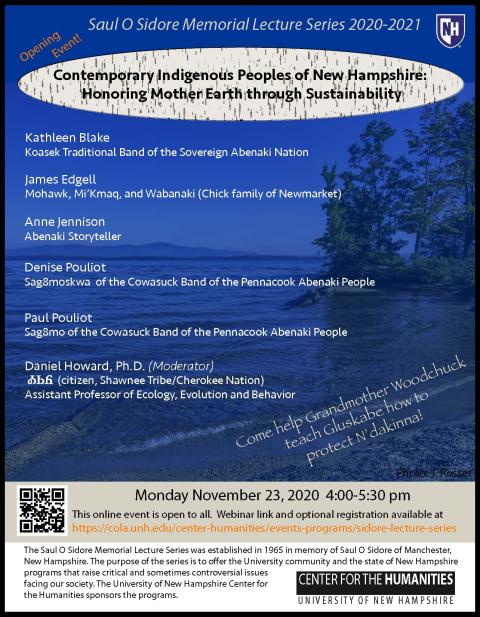
Event #1
Monday, November 23rd, 2020, 4:00 -- 5:30 p.m.
Theme of the Discussion: There is a growing movement to reframe New Hampshire’s history, correcting a common misconception in history books that the Native Peoples of New Hampshire perished with colonization. This panel will celebrate the Native Peoples living among us today, including the Cowasuck Abenaki and related Pennacook communities. Panelists will describe N’Dakinna (Our Homelands) and the relationship between the people of the region and their environment, including places within the New Hampshire landscape that we all recognize. They will consider the meaning of sustainability from an Indigenous perspective in relation to both culture and the environment in our region, including topics such as climate change, air and water pollution, resilient ecosystems, and food security. Finally, we will ask what Native Peoples of New Hampshire need from the citizens and institutions of New Hampshire in order to continue to practice, reclaim, and share (when appropriate) the Indigenous knowledge and practices of both ancestors and contemporaries.
Panelists: Kathleen Blake, Koasek Band of the Sovereign Abenaki Nation; James Edgell, Mohawk, Mi’Kmaq, and Wabanaki (Chick family of Newmarket); Anne Jennison, Abenaki Storyteller; Denise Pouliot, Sag8moskwa of the Cowasuck Band of the Pennacook Abenaki People; Paul Pouliot, Sag8mo of the Cowasuck Band of the Pennacook Abenaki People; Daniel Howard, Ph.D. (Moderator), citizen of Shawnee Tribe/Cherokee Nation, Assistant Professor of Ecology, Evolution and Behavior at UNH.
Event #2
Decolonizing Science: Centering Indigenous Science, Methodologies, and Practices
February 24, 2021, 4:00--5:30 p.m.
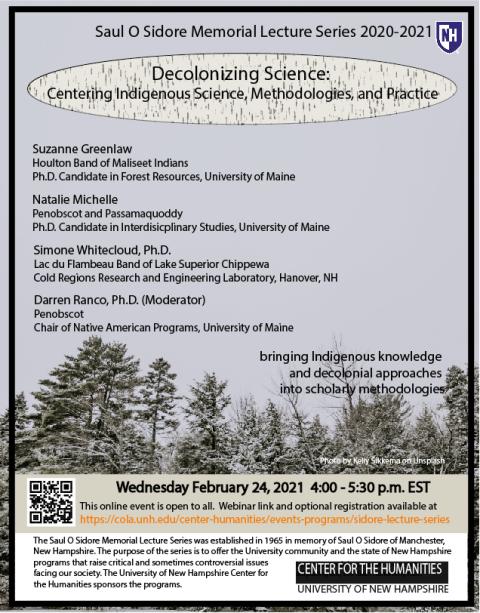
Decolonizing requires us to recognize the limits of Western science and reconcile academic research with Indigenous ways of knowing. This panel will showcase efforts within our region to bring Indigenous knowledge and decolonial approaches into scholarly methodologies, including the collection, stewardship, and analysis of data from Native lands.
Panelists: Darren Ranco, PhD (Penobscot), Chair of Native American Programs, University of Maine (panel moderator); Simone Whitecloud, PhD, Lac du Flambeau Band of Lake Superior Chippewa, Research Ecologist, Cold Regions Research and Engineering Laboratory, Hanover, NH; Suzanne Greenlaw, Houlton Band of Maliseet Indians, Ph.D. Candidate in Forest Resources, University of Maine; Natalie Michelle, Penobscot and Passamaquoddy, Ph.D. Candidate in Interdisciplinary Studies, University of Maine.
Event #3
Co-Producing Knowledge for a Sustainable World
Tuesday, March 30, 2021 4:00--5:30 p.m. EDT
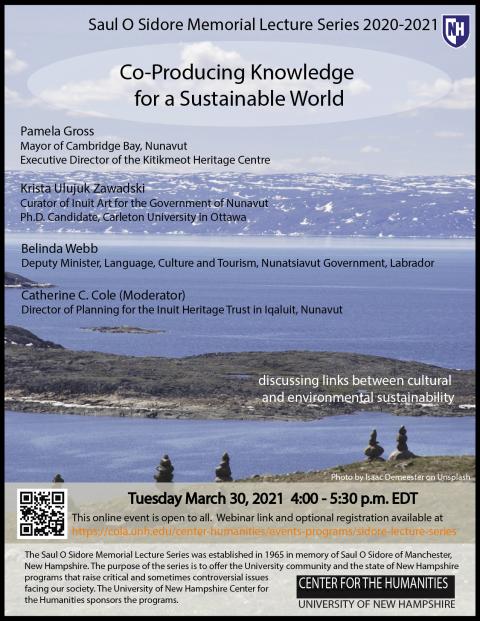
This panel will highlight Arctic voices discussing links between cultural and environmental sustainability. The goal is to provide New Hampshire residents with a better understanding of how sustainable futures in the North connect with our own experiences.
Panelists: Catherine C Cole (Moderator), Director of Planning for the Inuit Heritage Trust in Iqaluit, Nunavut; Belinda Webb, Deputy Minister, Language, Culture and Tourism, ?Nunatsiavut Government, Labrador; Krista Ulujuk Zawadski, Curator of Inuit Art for the Government of Nunavut and a PhD candidate at Carleton University in Ottawa; Pamela Gross, Mayor of Cambridge Bay, Nunavut and Executive Director of the Kitikmeot Heritage Centre.
Event #4 The Power of Storytelling in Indigenous Ways of Knowing
Thursday April 22, 2021 (Earth Day) 4:00--5:30 pm EDT
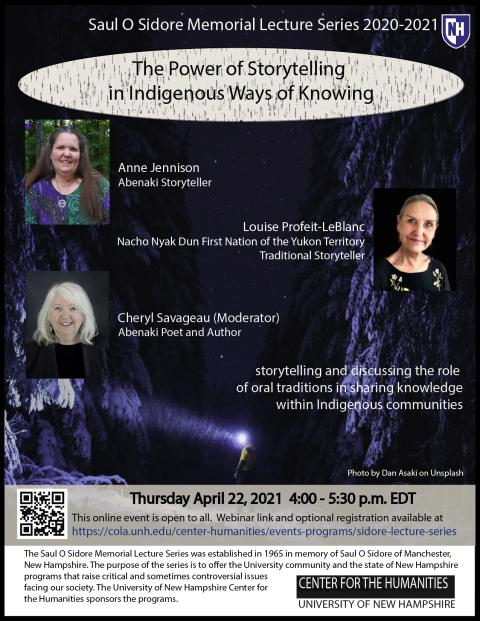
This event will highlight the power of storytelling and oral traditions in sharing knowledge within Indigenous communities. Anne Jennison, an Abenaki storyteller and UNH alumna, has been telling Native American stories and teaching throughout New England for over three decades. Louise Profeit-LeBlanc, a Traditional Storyteller from the Nacho Nyak Dun First Nation of the Yukon Territory in Northern Canada, is founder of the Yukon International Storytelling Festival and the Society of Yukon Artists of Native Ancestry.
Panelists: Anne Jennison, Abenaki Storyteller; Louise Profeit-LeBlanc, Nacho Nyak Dun First Nation of the Yukon Territory Traditional Storyteller; Cheryl Savageau (Moderator), Abenaki Poet and Author
Zoom link to join the webinar: unh.zoom.us/j/99905722869
Registration link https://unh.az1.qualtrics.com/jfe/form/SV_0Jko6GoqjncvgJU
Event #5 “The Council” A Dramatic Reading
Thursday, May 27, 2021 at 7 pm ET
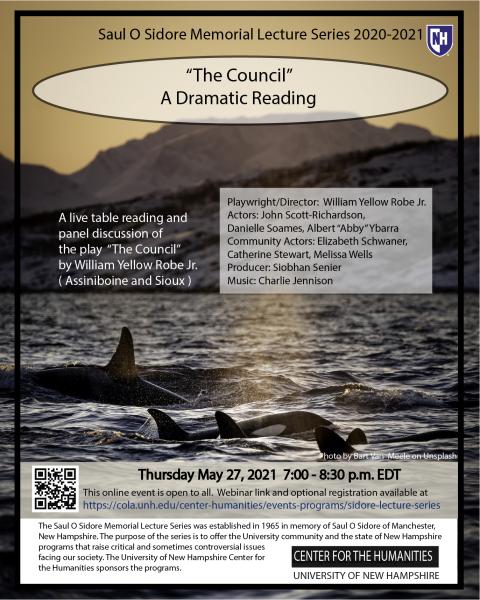
by William Yellow Robe Jr., Playwright & Director
featuring John Scott-Richardson, Danielle Soames, and Albert "Abby" Ybarra; music by Charlie Jennison
Registration link https://unh.az1.qualtrics.com/jfe/form/SV_eUQAOSdfe8tB0Tc
This event will center on the dramatic reading of the play “The Council” by William Yellow Robe Jr., a member of the Assiniboine and Sioux Tribes raised on the Fort Peck Indian Reservation in Montana. “The Council” describes the struggle of (hu)man to recognize his relationship among animals and potential for destructive power. The dramatic reading of the play will be followed by a panel discussion with the actors relating the themes of the play to contemporary issues in environmental sustainability and climate change.
The Saul O Sidore Memorial Lecture Series was established in 1965 in memory of Saul O Sidore of Manchester, New Hampshire. The purpose of the series is to offer the University community and the state of New Hampshire programs that raise critical and sometimes controversial issues facing our society. The University of New Hampshire Center for the Humanities sponsors the programs.